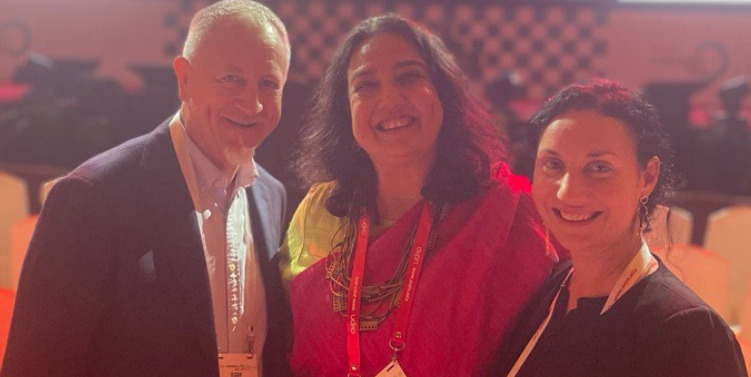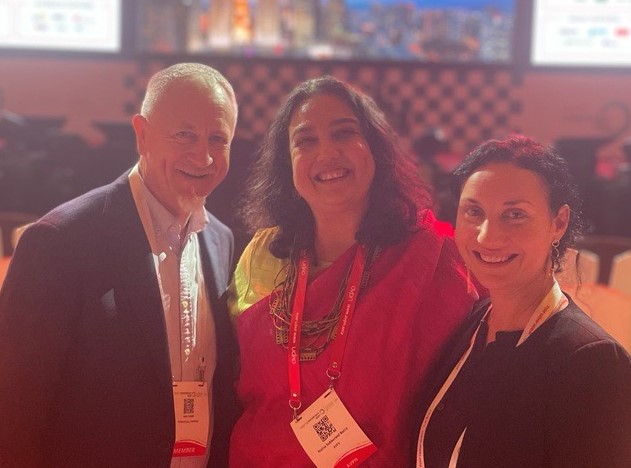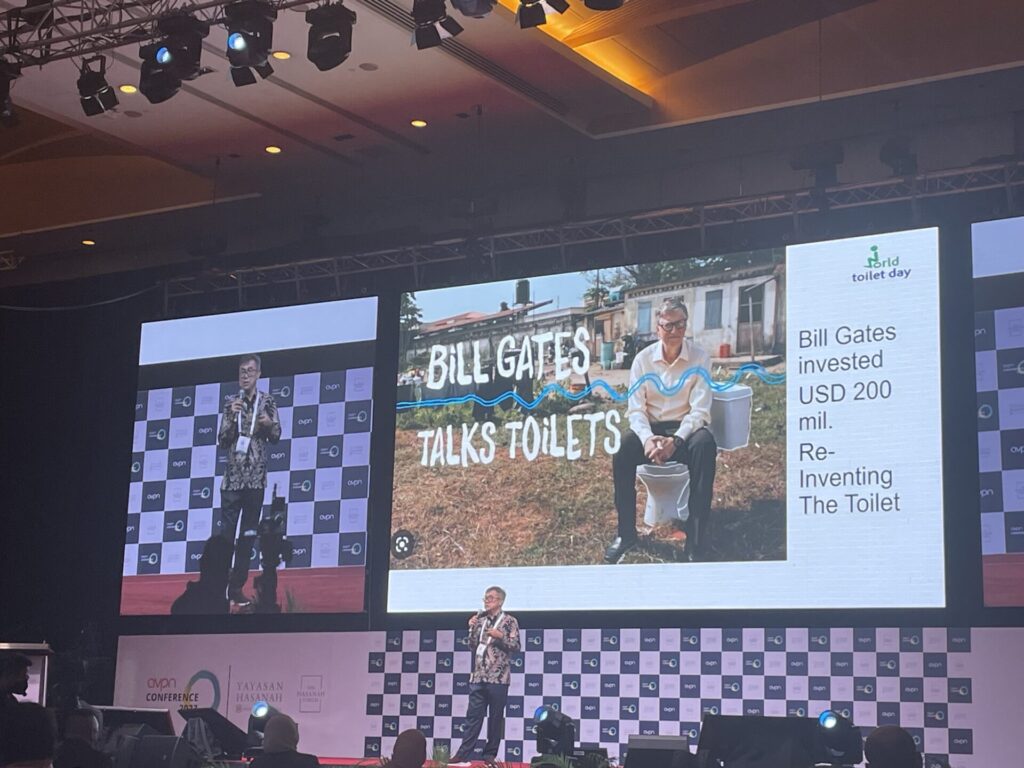
Philanthropy Australia’s CEO Jack Heath and Director of Learning and Content Renata Zanetti joined sector leaders from 44 countries in Kuala Lumpur, Malaysia, this week to discuss the latest in innovative leadership, impact investment and social impact. Renata reflects on the highlights.
The 11th AVPN Conference, held in Kuala Lumpur from 20-22 June 2023, brought together 1,329 delegates from 44 countries, including around 40 Australians, to hear and share insights on innovative leadership, impact investment and opportunities to drive justice and equity – and address urgent challenges, such as climate change.
AVPN CEO Naina Subberwal Batra, in partnership with Yayasan Hasanah, led conversations and brought together incredible speakers, panellists from family foundations, corporate foundations, government, academics and entrepreneurs to share insights, stories, lessons and opportunities.

Across the three days, several threads were woven together:
1. Philanthropy can play a transformational role through blended finance, and impact investing through providing “catalytic capital”. Philanthropic capital can also be incredibly powerful when applied to big challenges, through piloting ideas and having the capacity to take risks. Encouraging novel ways of approaching philanthropy, “entrepreneurial donors” such as James Chen encouraged ownership of the unique role that philanthropy can play to take risks and be willing to fail when addressing complex problems. His openness to fail, to be bold and to iterate and learn – in his case about creating access to reading glasses as a transformational and low-cost intervention that many said couldn’t be done. He noted that accountability can include recognising roles for both the “donors and the do-ers”, while also noting the broader context of accountability to his three-generation family foundation
2. Trust-based or participatory philanthropy can work well, but it does take time and patience to establish relationships. For participation, partnership, co-design, or in some contexts a reimagined word in China of “co-building” – it is important to pay and include people with lived experience and factor in that it may take a longer or cost a more to include translation (across languages, including sign languages). But it will result in a better understanding for everyone.
Dato’ Kathleen Chew, the founder and programme director of the YFL Foundation developed a partnership with the University of Birmingham to build an educational equity program to improve access to quality education for children in migrant communities. Including stakeholders as community partners, whether from civil society organisations, refugee-led organisations or other groups, takes a willingness to learn and be open to feedback on an ongoing basis.
Reshma Anand, Regional Director for the Ford Foundation for India, Nepal and Sri Lanka, encouraged those who received funds to not wait for a milestone check in – but instead to build a relationship, call and share challenges, or new innovations and breakthroughs.
3. There is incredible complexity in understanding and addressing the challenges that philanthropy works to address and in measuring impact. Measuring impact takes time, requires patience to demonstrate proof of concept, especially for new or novel initiatives. However, there are approaches that can be iterated, are consistent and that consider impact for ultimate communities, and metrics that can be shared or contextualised for each country context.
Since the SARS-CoV-2 pandemic there has been a rethink in some areas of what reporting is required, how health systems are sustained or strengthened and how to make sure that the impact “for who” is considered. Of a group of around 300 Asian-based foundations in the impact investment space, the Global Impact Investing Network (GIIN) showed around 91% align to Sustainable Development Goals (SDGs), 95% assess impact but just under 70% track progress against at the SDG indicators or target levels.
Nicholas Khaw, Head of Research at Khazanah Nasional Berhad, suggested the importance of checking interests versus impact: “Just because you are passionate [about a topic] does not necessarily mean it is the most impactful.”
4. To achieve the Sustainable Development Goals (SDGs) by 2030, mainstreamed approaches and innovative approaches – including through PPPPs – public private philanthropic partnerships are required. There is intersectionality across many diverse areas and many different lenses, like gender or climate, can be applied diagonally across areas such as health – to create climate-resilient health systems, for example.
In relation to mainstream inclusion and human rights, there are opportunities to adopt novel technology alongside non-tech options for people with low digital literacy. For example, while creating data on gender-based violence, the Red Dot Foundation gave individuals the options of also providing notes in a physical box, that could then be entered into database by trained volunteers. In Malaysia 2,500 farmers were asked about what they needed when lots of people were trying to create apps. The farmers suggested they didn’t need an app – they used WhatsApp.
Philanthropy Australia and AEGN released a Climate Lens tool in 2023 to help funders see — and mitigate against — the pervasive impacts of climate change, all of which are working to undermine the people, places and causes you serve.
Australians Investing in Women has designed a Gender-wise toolkit to ensure that grant makers and not for profits maximise their positive impact by successfully applying a gender lens.
5. Bold, courageous leadership with humility is required. In a panel chaired by Louise Pulford, Social Innovation Exchange, each of the speakers shared leadership insights on being bold and being humble. Professor Tan Sri Dr Jemilah Mahmood shared stories of working in the field dodging real bullets and in other roles, dodging political bullets. Professor Mahmood shared being open to learn, knowing when to ask for help, starting with an exit plan in mind and seeing success as having a team that is better than you.
6. Promoting wellbeing, dignity and mental health is essential, either in an ongoing way or in a crisis or disaster setting. In a rapid speech session, called INSPIR8, Asian trailblazers shared their stories. Jack Sim, the founder of the World Toilet Organisation (WTO) shared the crucial role that toilets can play to promote dignity, given the sobering fact that more than one quarter of the world’s population still lack sanitation. Through his work, the 19th of November is now a global designated world toilet day. Another INSPIR8 speaker, Puan Anita Abu Bakar spoke about her work to demystify mental health through the creation of an awareness and support association.
In crises contexts, noting the many disasters worldwide as listed on ReliefWeb, groups such as Give2Asia have noted that often there are funds provided in the early stages of a crisis, but ongoing support is needed and compassion for the workers on the ground, once the headlines fade. Together with Schmidt Futures they ran a workshop on the final afternoon to reimagine crisis capital, noting that when a crisis hits, coordination between donors is needed, reporting expectations need to be managed, and awareness campaigns for the public are needed of what can be donated and what can be used to promote dignity, rather than receiving trucks of clothes that are incorrectly sized and for the wrong weather, for example.
.

In addition to the 103 formal conference sessions and panels, there was a Malaysian cultural showcase of performances and a social enterprise marketplace.
The conference concluded with the launch of a new AVPN fund for Youth Wellbeing and Mental Health, including an announcement by YB Hannah Yeoh Tseow Suan, Minister of Youth and Sports, of a contribution from the Government of Malaysia. Congratulations to all of the AVPN and Yayassan Hasanah staff for an incredible conference. We look forward to sharing more insights from the discussions with our members in the coming weeks.